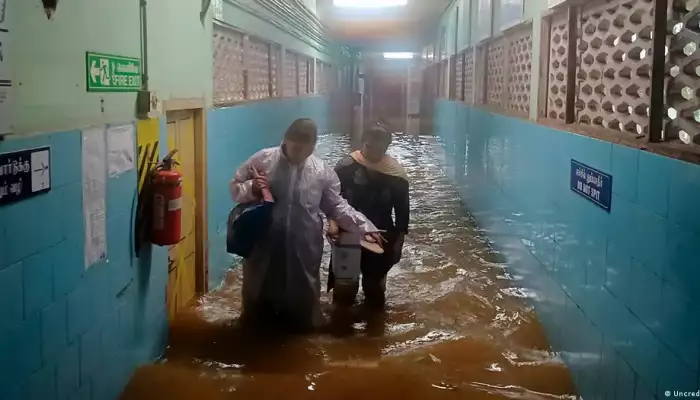
At least eight people were killed in severe floods in southeastern India as Cyclone Michaung made landfall on Tuesday.
The "severe cyclonic storm," which local authorities have described as "the worst storm in recent memory," brought with it winds of 90-100 kilometers per hour (56-62 miles per hour).
Waves of up to 1.5 meters (nearly five feet) above normal sea levels were also expected as the cyclone hit the coast at around midday local time near the town of Bapatla in Andhra Pradesh state, after also wreaking destruction further down the coast in Tamil Nadu state.
In the regional capital of Chennai, eight people were killed as chest-high waters surged down the streets. Cars were seen floating on raging torrents, homes were flooded, and even a crocodile was spotted swimming the streets in the city.
One person was killed by a falling tree, another was electrocuted by live wires in the water, and others drowned.
Indian Home Minister Amit Shah said the government was "braced to provide all the necessary assistance to [the state of] Andhra Pradesh," with rescue teams deployed and more "on standby to mobilize as needed."
Flooding in Chennai
Previously on Monday, authorities said at least four people had been killed in Tamil Nadu state in weather-related incidents while thousands of people evacuated from coastal communities as the region braced for impact.
Chennai airport, one of India's busiest travel hubs, had to suspend operations as the runway flooded, while schools and other centers of learning, along with banks and offices, have closed their doors in four districts of the city.
Cyclones – the equivalent of hurricanes in the North Atlantic or typhoons in the Northwest Pacific – are a regular and deadly menace on coasts in the northern Indian Ocean, where tens of millions of people live.
Cyclone Michuang is expected to reduce in power late in the evening on Tuesday.
But scientists have warned that such storms are becoming more powerful as the world gets warmer due to climate change caused by the burning of fossil fuels.